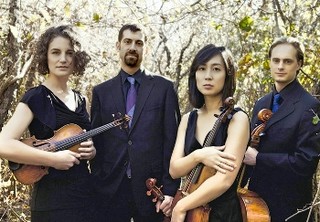|
Back
Spontaneous Combustion New York
Barge Music
09/26/2014 -
Complete Bartók String Quartets, Part 1:
Béla Bartók: String Quartets No. 2, Op. 17, Sz. 67, BB 7, No. 4, Sz. 91, BB 95, & No. 6, Sz. 114, BB 119
Masterworks Series: Chiara String Quartet: Rebecca Fischer, Hyeyung Julie Yoon (Violins), Jonah Sirota (Viola), Gregory Beaver (Cello)

R. Fischer, J. Sirota, H. J. Yoon, G. Beaver
(© Lisa-Marie Mazzucco)
My initial thought, when the Chiara String Quartet promoted itself as playing all the Béla Bartók string quartets from memory was disbelief. Not that they wewren’t able to do this. But that, after 15 years of being amongst the most distinguished young ensembles in the world, that they needed to resort to a “gimmick” to advertise their program.
That, I confess, was one of the great misapprehensions of my career. This was no trick, but the Chiara’s very conscious way of saying that they could actually communicate better, that by learning the music from the outside, they could learn make it part of their inner beings. That Bartók’s music spoke for itself with such force, that no page-turnings of staves should interfere with their own performances.
Visually at BargeMusic last night, even without the music, one could understand this. Even in this most fervent exciting moments (and in Bartók, those moments were actually movements), the players looked at each other, summoned up more strength, played with what seemed to be spontaneous combustion.
That was of course necessary in Bartók, since there will never be a “best” performance. Whether we are looking at the classical structure of the Emerson, the Magyar force of the Vegh or the astringent Juilliard quartets, Bartók lends itself to the most radical playing.
The Chiara String Quartet has the rare distinction of a personal closeness (second violinist Hyeyung Julie Yoon married to cellist Gregory Beaver, violist Jonah Sirota commissioning his distinguished composer father for new works), but they have that toughness, that energy, that vitriolic expertise which makes every moment leap forward.
The actual barge of BargeMusic was creaking and swaying last night, but one could attribute this as much to the Chiara as to the East River tides.
The first of two programs had the “even” string quartets, with the odd three scheduled in two weeks on October 17. Numbers 2, 4, and 6, though, were so different, from three entirely different periods of Bartók’s life, that last night we heard a kaleidoscope from one of the three greatest composers of the 20th Century.
Each was helped along with cogent introductions from cellist Beaver, including an original tape of a song recorded by Bartók in Morocco’s Atlas Mountains, used later in a quartet. But those prefaces were nothing compared to the tense, pinpoint-sharp performances of these four players.
As Mr. Beaver said, the Second Quartet could have come from the very last part of the 19th Century–in theory. But the Brahmsian melody which opened the work quickly–very quickly with the Chiara–became fragmented, more and more dissonant. No effort by these four was made to “ease” the harmonies. The strings played hard on the board.
But it was this second movement where Chiara came into its own. Not with the dissonances but with the dance movements. Here, they didn’t sound like Eastern European music, yet each soloist kept the music going with wild energy.
(Not so much energy, though as the middle two movements of the Sixth Quartet. I once heard this played in an Indonesian village, by an ensemble whose car had broken down, and the villagers, began to instinctively almost genetically dance to this music.)
The Fourth Quartet was, if may say so, startling. No matter how many times one hears this on record, to see four very nice young players be so damned impolite with their bows. Chiara allowed the sounds to shriek, the glissandis to roll over with microtonal accuracy. This movement may have a “classical” structure for the conservatories. But in BargeMusic, it was grotesquerie and grandeur at one time. And Chiara never let down the side.
Those two middle movements were also unearthly, but less macabre, more mystery. The cluster chords those quasar-alternations of pizzicato and bowing, all made their effect. That violin solo in the third movement is usually reminiscent of a bird. Rebecca Fischer had a far more interesting sound. Hers was the sound which we might imagine a firefly would make. (The reality of insect noise is legs rubbing against abdomen, but Ms. Fischer gave these lightning bugs and aphids actual notes, actual music.)
For the final quartet, the enigmatic Sixth, I doubt if any quartet can make it “mean” something. (As if any music has “meaning” outside itself.). But the strange viola opening, the drumming and those close-knit harmonies and harmonics were played with all the mystery we needed.
As mentioned above, the middle movements were the equivalent of, say, Beethoven’s Promethean laughter, but the finale showed exactly why the Chiara String Quartet didn’t need their scores.
In effect, all four movements are marked mesto–sad. But nothing here imitated the longueurs of, say, Tchaikovsky. It was a sadness hinging on the bitter, on the existential, on the absurdity before the Molto tranquillo ending. Most performers play it with utmost restraint. The Chiara String Quartet seemed to squeeze the sounds together, as if Bartók had composed a Black Hole, ready to pull in any floating emotion left in the BargeMusic hall.
This was, in effect, one of those special evenings which transcend “great music.” Those who missed the “even” quartets have a chance to visit Chiara at BargeMusic on the 17th, when the “odd” ones will be performed.
For the players, working without the score is perhaps a liberating experience. For us in the audience, it was an exercise in the art of anguish.
Harry Rolnick
|